I. The Stories of Guljon Bibi and Roshan Noma
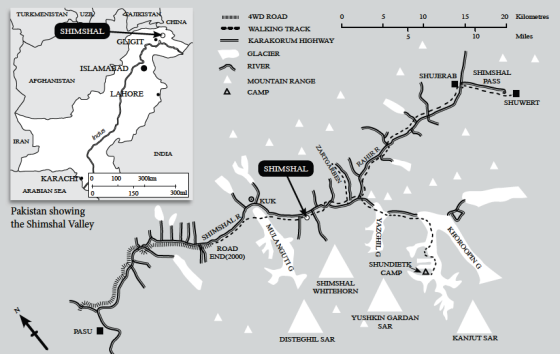
Map of Shimshal Valley, with inset showing its location in Pakistan. Please click to enlarge. Copyright. Pam Henson.
Editor’s note: Shimshal is a remote Ismaili village which lies at an altitude of 3,100 metres above sea level, and is the highest settlement in the Hunza Valley of Pakistan. It is surrounded by innumerable, fascinating and awe-inspiring peaks, glaciers, alpine meadow and trekking routes. It is the bordering village that connects Gilgit-Baltistan province of Pakistan with China. The village of about 2000 devout Ismailis was inaccessible by road until October 2003, when a new road from the Karakoram Highway at Passu was constructed with the mutual cooperation of the Aga Khan Rural Support Programme, the Government of Pakistan and the local community. Shimshalis use numerous seasonal mountain grasslands (known as the pamir), located several days walk from the village, to sustain herds of yaks, goats, and sheep. It is said that the ‘sons of the land’ are matchless in terms of their mountaineering prowess, techniques and skills, and are recognized as amongst the world’s best mountain climbers.
Pam Henson of New Zealand has visited Shimshal four times, either as a trekker or a volunteer teacher. During her last visit in 2006 she invited women to talk about themselves, and documented their remarkable and candid revelations in a ground-breaking book called Women of Shimshal. She has dedicated her 2010 publication “to the women of Shimshal village who have hosted me, treated me as one of the family, and shared the riches of their lives with me.”

Bibi Inayat and her mother-in-law Farzana Faiz shown on cover page of “Women of Shimshal” by Pam Henson. Copyright.
Pam Henson has graciously given Simerg permission to put extracts from her book on this website, and we are deeply indebted to her.
Simerg’s 3-part series will be an eye-opener to readers who are unfamiliar with the working of traditional societies. From childhood, early marriage and family relationships to the hardships women endure in a struggle to survive and succeed, the voices in the stories will confide in the reader, sharing the deepest secrets of Ismaili women in Shimshal for the first time.
_____________
Introduction
By Pam Henson
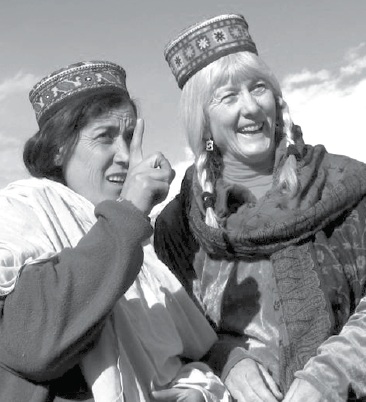
Hussn Bibi, left, and author Pam Henson pictured in Shimshal in 2006. Photo: Pam Henson. Copyright.
From my first visit [in 2000], it was the lives of the women of Shimshal that intrigued me. In 2006 I decided to interview some of the women about their experiences. The following stories were related to me with Hussn as a translator. The whole process was tape-recorded, and then transcribed when I got home to New Zealand. I edited the transcript for fluency and ease of reading, trying to keep as closely as possible to the original ideas. Each of the women I talked to knew that her responses and my photographs would be published.
The Story of Guljon Bibi
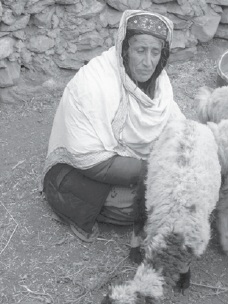
Guljon Bibi milks a sheep. Photo: Pam Henson. Copyright.
Pam Henson: Guljon is the mother of Hussn Bibi , the Shimshal woman who lived in New Zealand for a year (Hussn’s story will be published in the final part of this series – ed). Guljon is now in her late 60s, and still works on the family small holding, looking afer the animals.
MARRIAGE AT AGE TEN AND THE JOURNEY TO SHIMSHAL
I am Guljon Bibi. I’m about 65 years old and I was born in Hussaini, a village in the Hunza valley. I have three brothers and two sisters. I got married when I was ten years old. My mother was from Shimshal, and that’s why she sent me back there to get married. The groom’s family came to Hussaini and celebrated the wedding with my family. There was local music and dancing. After that they took me to Shimshal. There was no road to Shimshal in those days. We had to cross the river 32 times. People had few clothes then, just one pair of woolen trousers and home-made hide boots called sundall with very thick socks and clothes inside. When they crossed the river they took off their pants and boots and put them on again on the other side. It was so cold that their bare feet stuck to the rocks with the freezing water. They warmed up their feet on their woollen trousers before getting dressed again. People carried me on their backs to bring me here.
When we got to Wayinur Sar I began to miss my parents. The escort party was having a rest because they were carrying a lot of luggage, so I ran away, wanting to go back to my mother. But they caught me and brought me back. Afer that, I cried and cried. There were two groomsmen in the party. They were older men who looked afer me, the bride, and the fifteen year old groom. They were called tat or father. The tat who caught me was kind and persuaded me to go on to Shimshal.
The journey took three days with two nights on the way. On the second night the weather turned very cold and there was not enough bedding. So the party made a big fire, and afterwards they flattened the soil and slept on the hot ground. It was my first experience of this technique, and I didn’t want to sleep on the ground. But my tat persuaded me that it would be best. Next day was the groom’s celebration. The family had killed four or five goats. There was meat and baat, made from flour, water and butter. The food for wedding feasts hasn’t changed. We still have the traditional food.
EXTENDED FAMILY AND RESPONSIBILITIES
After the festivities, I was upset because I had never met the family before, and I didn’t know who would look after me. The extended family included seven young relatives, orphans whose parents had died because of various illnesses for which there was no treatment available in Shimshal because of its remoteness. It was quite usual to live in large families. Life was hard, with not enough food or clothes. So if people lived together they could share. My household had five brothers. I became a sort of house-mother with many responsibilities. It was the custom to get married very young. Afer two or three years, an older couple living in the house died and I got even more responsibilities. I had my first child at 23 years old.
HUSBAND – A MUKHI
My husband was a weaver, and at seventeen or so he was paid for his work in cooked meals. This was the main source of food for the family. My husband continued weaving until five or six years before his death and we still have his loom in the house. Weaving was the support for the family, as ways to farm productively were not well-known. We didn’t have enough fertiliser Once the orphan children were married and had moved into their own homes, my immediate family could spend more time farming. I never went to school, as there was no education system in Shimshal then. My husband could read and write, though. He had a special religious function in the village. He was the mukhi (lay preacher) for six years and was also the person who offered prayers for people on their wedding day.
HUNGER AND HARD WORK
Earlier on my life was very hard and tough. I never had enough clothes to wear. When I had shoes, I was told to keep them for best. I rarely had enough to eat, especially on the first trips to pamir (the high and remote summer pastures where many of the village women stay for five months of the year herding the sheep, goats and yaks, while the crops are growing down below). )I was always hungry. It was the same for everyone in Shimshal. There was no factory-made fabric. Only when someone came from Pasu to marry did we see manufactured clothes. Everyone wore home-made woollen trousers, a woollen shirt and a woollen coat, winter and summer. It was horribly uncomfortable, hard and scratchy. We only had one outfit. When we had a period we had to wash the cloths then put soil on them to absorb the water and wear them damp. The native Shimshali women had only one shalwar kameez, but a woman who came here from Pasu might have other outfits sent as gifts by relatives. I started going to pamir when I was very young.
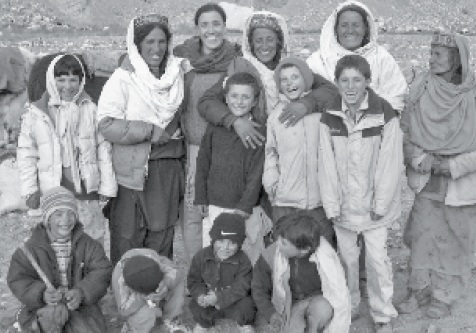
Grandmothers and grandchildren reunited when the older women return from the
the pamir (high pastures). Photo: Pam Henson. Copyright.
My job was to watch the grazing animals. When my oldest son married, my daughter-in-law could look after the house and I went to pamir every year. My responsibility is to make cheese and butter for the family. I like the high pastures and the busy time I have there. I enjoy the work of looking afer yaks, goats and sheep and producing the butter and cheese. I like to be productive and to feel that I’m useful. However, the track to pamir is frightening and exhausting. Sometimes my toenails fall out afer the trek there or back.
INTERESTS AND SATISFACTION
I have sore knees and joints now, but this is only recent. I don’t read or write but I am very interested in animal husbandry and I have always worked hard on the farm. It was my dream for my children to be educated so I worked hard and provided their education. I gave my daughter Hussn in marriage when she was nine years old. I thought then that it was the right thing to do, because our lives were such a struggle to get the basics. I sold woven clothes and some animals to pay for Raza, my oldest son’s education. Often he could teach and pay his own way while he studied for a degree. His job made the family financially secure. Now my children have all got jobs as adults, I feel very satisfied. My children respect me, and as all of them are earning money, which is quite unusual, they are able to support me. My husband died nine years ago. We had always got on well. He died of asthma. Raza was supporting us by then. This year I might take a break from the pamir. I might go to Karachi and visit my younger son and my two grandsons. I don’t think I will like Karachi much, but I am really looking forward to the visit. It will be a new experience for me. It only takes three hours sitting in a car to get out of the valley now, not three days hard walking, carrying a heavy load. Communication, shopping and transport are all much easier since the road was finished.
_____________
Shimshal Contrasts
_____________
_____________
The Story of Roshan Noma
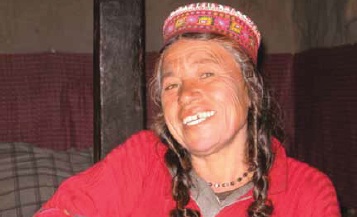
Roshan Noma. Photo: Pam Henson. Copyright.
Pam Henson: Roshan lived in the house opposite to the one Lynette and I borrowed in 2000. She spoke no English at all, so we could not converse, but we always liked the look of her. She had a comfortable figure and looked motherly, but as well she was farming on her own when we first arrived, an unusual and impressive achievement.
EARLY MARRIAGE AND TREATMENT
I am Roshan Noma, from Pasu. I’m 45 years old and I have four sons. My mother died when I was young, and I was living in the house with my brothers and sisters-in-law. My father was kind to me, but my sisters-in-law did not treat me well. I got my periods when I was twelve. I was frightened and kept it a secret from my sisters-in-law. I went to my grandmother’s house instead and she helped me. Afer that, I could get married. My future husband, Asmat Shah, was a distant relative and used to come and stay with us. I liked him a lot and we fell in love. He was married to Hajat Begum, but they had no children. So he divorced her and married me. I married when I was twelve years old. In those days women were not close to their husbands, and it was the same with me. I was very shy. I was nervous about being married, but I managed. We had a full marital relationship from the beginning. I loved my husband and he was very kind to me, careful not to hurt me.
KARACHI
When I came to Shimshal I was happy and excited about the new place, the house, the new family I was part of. My husband’s family seemed good to me at first. I lived with them for twelve years while my husband was in the army. Then his mother died and I didn’t get on so well with my sisters-in-law, so my husband Asmat took me to Karachi. At this time I had no children. But we were very happy together, and had a loving relationship. We stayed in Karachi for 17 years, and during that time I had four sons.
Life in Karachi was easy in some ways, but it’s financially tough in the city. As I was uneducated, I couldn’t get a job so I looked after the children, took them to school and did the housework. Often I was sick for three years, and we had to spend lots of money on medicine. We were keen to educate our boys well, but we had financial problems. I was depressed and worried about the children and the lack of money, and thought that if I came home a change of environment might help me to recover.
BACK TO SHIMSHAL
So I came home to Shimshal on my own and managed the family farm. The kids then ranged from eight to fifteen years old. In Karachi they suffered from lack of parental supervision, because Asmat Shah was working full-time. But there was nothing he could do about that. Afer a time two of the boys came back to Shimshal, because we were concerned about them getting into bad company and we could see changes in their behaviour. Asmat Shah didn’t ask me to go back to Karachi because he always intended to return to Shimshal. My children have good potential but they were in a bad situation. (Roshan is crying.)
I am careful never to blame my husband for any of our problems. He has had a hard life. During his time in the army he was imprisoned in India for four years. Later, in Karachi, he was jailed for his part in a fraud case in which he was an innocent dupe. That was when I was in Shimshal. The boys were on their own during his imprisonment. I visited him twice in prison. When I returned to Shimshal, the house was completely bare and I had to set up house from scratch. People in the village gave me sheep and goats, and on my own I grew wheat, potatoes and apricots.
A HAPPY FAMILY
My oldest son, Nasir, hoped to get a family member to sponsor him through university, but that didn’t happen so he had to get a job. At the moment my youngest son, Akbir, is going to high school in Islamabad, and his older brother Karim is supporting him and trying to get him into a hostel. Akbir is very clever, but I can’t rely on my other sons to support him and pay his way. Now my husband has come home and I feel happy again. We work together on the farm and share our ideas. The road makes life easier for us. When there was no road I used to visit my brothers in Pasu and I had to carry all my own luggage. Now the threshing machine comes in by road to thresh our wheat, and we can also send out our potatoes to get some cash. In many ways life is easier now.
Postscript: Roshan Noma died in Gilgit hospital in February 2010, possibly of a diabetes.
Date posted: Friday, October 5, 2012.
Date updated: Sunday, November 18, 2012 (link to Part 3)
Copyright: Pam Henson and The Shimshal Trust.
Part 3: Tales of Ismaili Women of Shimshal: Hussn Bibi and Her Journey to New Zealand to Study English
_____________
GLOSSARY:
baat – Local dish made from flour and water into a thick paste and served with melted butter
Dupata – Long head scarf worn by the women
dzo – A cross between a yak and a cow
Ismaili – Second largest branch of Shia Muslims. His Highness Prince Karim Aga Khan is their current spiritual leader
Matric – Matriculation exam taken at the end of year 10 and if passed gains the Secondary School Certificate.
mukhi – A lay preacher who conducts all religious ceremonies in the village.
pamir – the pamir are the high mountain pastures around Shimshal
shalwar kameez – Baggy trousers and shirt worn by men and women in Asian Muslim communities
tat – Means father, and is used to refer to older men who look afer the young bride-to-be.
Readers are invited to obtain more information about the Shimshal Trust by visiting their website, www.shimshaltrust.org.nz.
_______________
We welcome feedback/letters from our readers. Please use the LEAVE A REPLY box which appears below. Your feedback may be edited for length and brevity, and is subject to moderation. We are unable to acknowledge unpublished letters. Please visit the Simerg Home page for links to articles posted most recently. For links to articles posted on this Web site since its launch in March 2009, please click What’s New.

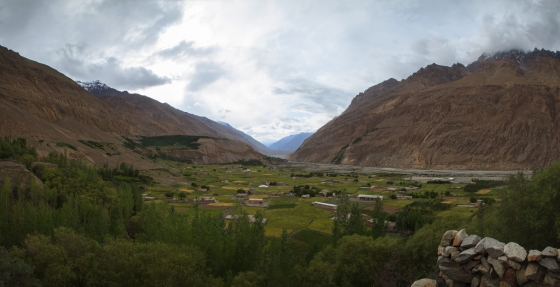
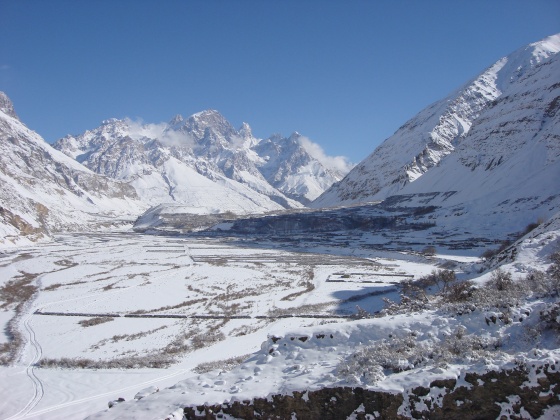
Oh why did I miss this until now! An excellent effort which can be replicated in other areas.
Thank you Simerg for sharing such an extra ordinary life stories of Ismaili women from Pakistan. I would recommend readers of this blog to visit the below website also. http://www.mountainvoices.org/pakistan.asp.html
Wow this story make me Cry ,
Very nicely done, Simerg. Often individuals and their lives are forgotten. Pam Henson has done a service by bringing us to Shimshal . remarkable . I can see why development work takes such thought – there are grades of change .
Such touching stories and so much strength!!
Thank tou